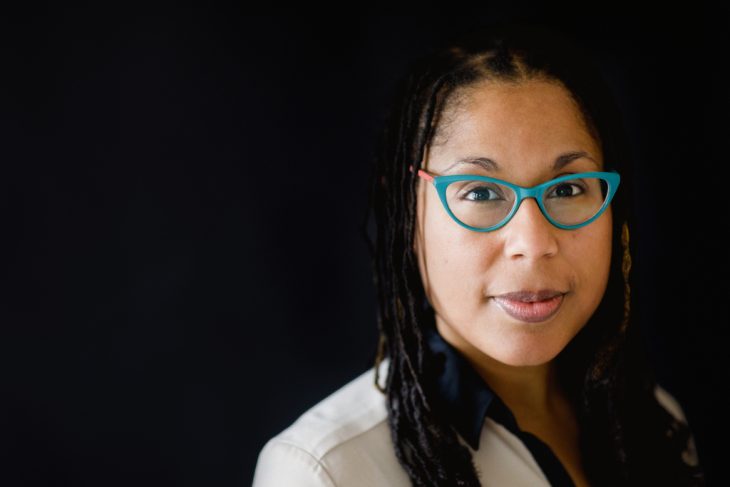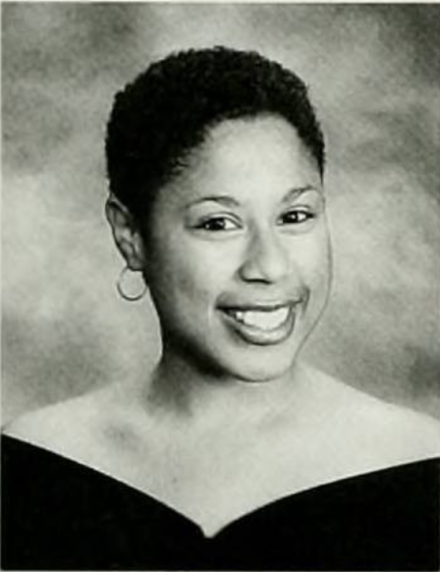As executive director of She Built This City, Faustin provides industry disruptive programming that sparks interest and builds pathways to lucrative careers in the skilled trades for youth, women and marginalized communities.
 In the summer of 2020, as the world grappled with the widespread upheaval caused by COVID-19, LaToya Faustin ’04 took a leap of faith to help build up the community around her.
In the summer of 2020, as the world grappled with the widespread upheaval caused by COVID-19, LaToya Faustin ’04 took a leap of faith to help build up the community around her.
Just months earlier, Faustin crossed paths with the founder of She Built This City, a Charlotte-based nonprofit created to spark interest in construction and maker trades for women and girls.
“We aligned on our belief that the trades are a lucrative path of upward mobility for women and marginalized communities,” says Faustin. Months later, she received an offer to join the nonprofit as its executive director.
“It was a risk for me and my young family, especially during the pandemic,” she says. “But I saw the potential and knew it was something I could fully get behind.”
Faustin’s enthusiasm notwithstanding, growing a small and young nonprofit during a pandemic came with its own set of challenges. COVID-19 put additional strain on the economic mobility of women, with two million fewer women in the workforce than the previous year. In response, She Built This City launched two big initiatives: an all-female cohort in plumbing pre-apprenticeship and an all-women repair crew.
They also embraced technology to transform in-person camps and workshops into virtual gatherings, enabling the team to carry on with the nonprofit’s mission to teach girls and women valuable skills in construction and maker trades despite the pandemic.
In addition, Faustin and her team took the gender exclusion off their programming, after realizing there was a greater population to serve. They wanted to be of service to working families and parents looking for jobs, too.
“While we will continue to focus on closing the gender gap in representation in the construction industry, we realize that giving access to youth in general — and marginalized communities in particular — is beneficial to both our community and the industry as a whole,” said Faustin during an interview with the Charlotte Business Journal.
Since graduating from Elon in 2004, Faustin has built a career working for and leading organizations that serve marginalized populations, starting with Teach for America. With a passion for serving the Latinx community, she worked for three years on the border of Texas and Mexico, which impacted her as an individual, as well as the trajectory of her career.
“It was there that my heart for community development was born,” says Faustin. “I saw a different kind of poverty there. I realized that no matter what I did within the four walls of the classroom, if circumstances outside of the classroom such as affordable housing and workforce development didn’t exist, then the efforts inside the classroom were futile.”

Faustin credits her time at Elon with affording her the connections and experiences she needed to build the skills she has used throughout her career. As a Leadership Fellow, member of the yearbook committee and even a dancer at Spring Convocation featuring Elie Wiesel, Faustin took part in everything she could at Elon.
“I have used every single bit of my education from Elon,” said Faustin, who graduated with a double major in communications and Spanish. “Some of the fundamentals of public relations and marketing are essential in the kind of work that I do.”
Through her Spanish major, she acquired both the language and a deep appreciation for the culture. Like many of her fellow alumni, Faustin also found a mentor at Elon that shaped her path. Through her work-study experience as a student assistant with the Office of Minority Affairs (which has since become the Center for Race, Ethnicity & Diversity Education, or CREDE), she connected with former staff member L’Tanya Richmond ’87.
“My work-study experiences on campus gave me some of the most valuable education I received at Elon,” says Faustin. “Watching [Richmond] grow the program from the ground up and build the foundations for pillars of Elon life now, such as the Black Excellence Awards and the SMART mentoring program, gave me a front-row seat to how she built a legacy.”
Faustin later returned to Elon to pursue her MBA and is now seeing the benefits at She Built This City.
“My business degree has given our organization a competitive advantage. I’ve more than quadrupled revenue and staffing since I started, and we’re preparing for expansion. I credit that largely to the hands-on, practical instruction I received in the MBA program,” she says. “From strategy simulations to studying abroad in China, the lessons I learned there were transformative in my understanding of systems and strategies. Elon taught me to take the bull by the horns and seize every opportunity that came my way. That has become an inextricable part of my DNA.”


